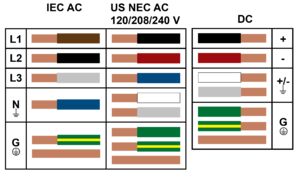Difference between revisions of "Insulation color"
Jump to navigation
Jump to search

| Line 1: | Line 1: | ||
| − | [[Category: | + | [[Category:Conductor]] |
[[File:Wirecolor201127.png|thumb|right|'''IEC/NEC AC circuits from top to bottom:'''<br />L1, L2, L3 refer to ungrounded current carrying conductors. N refers to grounded current carrying conductors. G refers to protective grounding system.<br/>'''DC circuits from top to bottom:'''<br />Ungrounded positive, ungrounded negative, grounded conductor, and protective grounding system.]] | [[File:Wirecolor201127.png|thumb|right|'''IEC/NEC AC circuits from top to bottom:'''<br />L1, L2, L3 refer to ungrounded current carrying conductors. N refers to grounded current carrying conductors. G refers to protective grounding system.<br/>'''DC circuits from top to bottom:'''<br />Ungrounded positive, ungrounded negative, grounded conductor, and protective grounding system.]] | ||
Wires can come with insulation (used for carrying current in a circuit) or without insulation (used for [[Grounding system|grounding system]]). If the wires have insulation, it will be possible to choose from a variety of different colors each of which is used to signify the purpose of that wire within an electrical installation. The standards vary from country to country, therefore it is necessary to research the practices in your location. Additionally, the appropriate colors will vary in each country depending upon whether the circuit is [[Types of electricity|alternating current (AC)]], [[Types of electricity|direct current (DC)]] and the system voltage. | Wires can come with insulation (used for carrying current in a circuit) or without insulation (used for [[Grounding system|grounding system]]). If the wires have insulation, it will be possible to choose from a variety of different colors each of which is used to signify the purpose of that wire within an electrical installation. The standards vary from country to country, therefore it is necessary to research the practices in your location. Additionally, the appropriate colors will vary in each country depending upon whether the circuit is [[Types of electricity|alternating current (AC)]], [[Types of electricity|direct current (DC)]] and the system voltage. | ||
Revision as of 14:51, 30 November 2020

IEC/NEC AC circuits from top to bottom:
L1, L2, L3 refer to ungrounded current carrying conductors. N refers to grounded current carrying conductors. G refers to protective grounding system.
DC circuits from top to bottom:
Ungrounded positive, ungrounded negative, grounded conductor, and protective grounding system.
L1, L2, L3 refer to ungrounded current carrying conductors. N refers to grounded current carrying conductors. G refers to protective grounding system.
DC circuits from top to bottom:
Ungrounded positive, ungrounded negative, grounded conductor, and protective grounding system.
Wires can come with insulation (used for carrying current in a circuit) or without insulation (used for grounding system). If the wires have insulation, it will be possible to choose from a variety of different colors each of which is used to signify the purpose of that wire within an electrical installation. The standards vary from country to country, therefore it is necessary to research the practices in your location. Additionally, the appropriate colors will vary in each country depending upon whether the circuit is alternating current (AC), direct current (DC) and the system voltage.
IEC standard for residential AC wiring
- Phase 1 - Brown
- Phase 2 - Black
- Phase 3 - Grey
- Neutral - Blue
- Ground - Green with Yellow Stripe/without insulation
US NEC standard for residential 120/208/240 V AC wiring
- Phase 1 - Black
- Phase 2 - Red
- Phase 3 - Blue
- Neutral - White or grey
- Ground - Green/Green with yellow/without insulation
Standard for DC wiring in PV systems
- Ungrounded positive - Red
- Ungrounded negative - Black
- Grounded negative or positive - White or grey
- Ground - Green/Green with yellow/without insulation